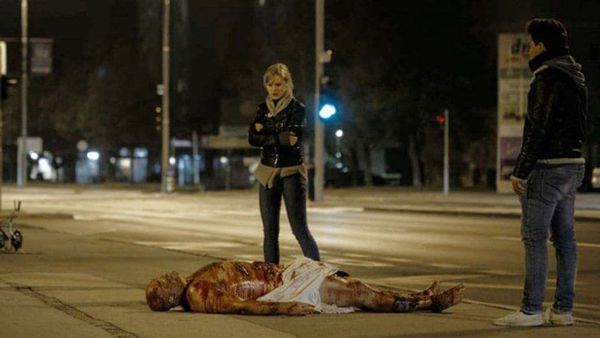Eye For Film >> Movies >> Nightlife (2016) Film Review
Nightlife
Reviewed by: Amber Wilkinson

Damjan Kozole's Nightlife, which won the Best Director title at Karlovy Film Festival is based, loosely, on the true story of a man who was found lying naked and badly injured in the middle of the street in salacious circumstances, having apparently been savaged by dogs. This 'based on fact' element of the film proves to be problematic as the accusation one of Kozole's characters levels at society - that "people are more vicious than dogs" - is uncomfortable when you consider that by making this man the subject of his film, albeit wrapped in a cloak of fiction, Kozole and co-writer Ognjen Svilicic are themselves throwing his story to 'the dogs', at least on some level.
We meet Milan Potokar (Jernej Sugman) just long enough to establish he's a high-flying lawyer and decide that we probably don't like him before we see him in a bloody heap, while passers by call for an ambulance. The film, however, is less about the man himself than society's reaction to what happens to him - his rescuers, for example, shoot photos of him on their camera phones in an early indication of where the film is going. This fear of society's reaction is what drives his wife Lea (Pia Zemljic), whose life we will follow over the night. When she gets to the hospital, she realises that her husband's injuries are just the tip of the iceberg as he was found with something she immediately seeks to cover up.

Kozole goes to great lengths to keep us guessing about what this item maybe initially, which is just as well, as once it is revealed much of the tension drains from the movie. What holds the interest is Zemjic, present virtually all the time, and whose every movement carries the twitch of anxiety, encapsulated in a scene in which she sits in a hospital toilet, pitifully trying in multiple ways to hide the evidence.
Beyond her distilled performance in the face of marching and uncaring bureaucracy, which brings with it an element of moody tension, the film is flat and thinly drawn. The use of handheld camera is more distracting than immersive and gives the film a dated air, while the script refuses to dig beyond surface accusations and hand-wringing about the state of society. Kozole sits in judgement of us but has no interest in establishing motive.
Reviewed on: 10 Oct 2016















